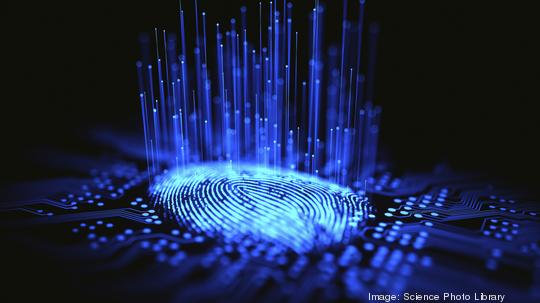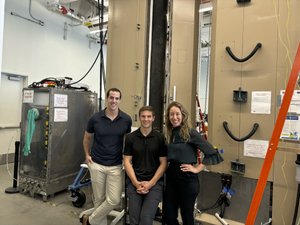
“Why does nobody here in this café misbehave?” asked HumanID cofounder Bastian Purrer in an interview. “Because if you misbehave, you’re going to get kicked out. You can’t just copy yourself and come back assuming a different identity.”
The six-person team behind the nonprofit, led by Purrer, a Harvard Business School student, is working to bring this kind of offline accountability to the internet.
The world’s virtual platform is overrun with fake identities, untrue information and illegal avenues to disseminate users’ private details. For context, a 2018 study found that at least 48 million Twitter accounts aren’t real people.
To combat these problems, HumanID created a new single sign-in service that replaces conventional site-specific logins. When people use their fingerprint to login in through HumanID, the service creates an individual and untraceable identity for them—a pseudonym of types—on every platform they enter.
The social login alternative ensures that a greater number of website users are authentic and that these users remain safe, private and protected in an increasingly ruthless internet culture.
HumanID encrypts phone numbers and email addresses, securing them safely away from hackers and media giants. The nonprofit’s database stores users’ country codes but relinquishes access to the rest of the information they encrypt.
The technology prevents some of the internet’s biggest problems: bot manufacturing, privacy invasion and misinformation.
In the long run, Purrer aims to make HumanID and its focus on user protection “standard protocol for the internet to use and build on top of.”
The nonprofit is working to partner with companies—video streaming sites, social media platforms, and print publications with digital presences—who can integrate the nonprofit’s sign-in service into their websites.
In early October, Purrer launched the web and Android version of HumanID. An iOS version of the technology will be available by the end of the month. The software will first appear on multiple news sites and a financial budgeting application in Indonesia, where the issues HumanID fights are rampant.
The nonprofit's five-person tech development team and co-founder turned CTO, Gilang Bhagaskara, are based in the South Asian country.
"The case of fake news in my country is actually very huge," said Bhagaskara. "It’s very easy to find the source of the problem and solve it here in Indonesia, especially with recent events like the political elections going on right now."
HumanID's built-in verification processes are its crowning component. The thorough verification system helps websites fend off non-human identities by requiring each profile to have a unique phone number and SIM card. This standard raises the price of effective bots by 10 or 20 times, making them less accessible to hackers and trolls.
“We verify the phone number, but it is immediately deleted afterwards,” said Purrer. “Plus you need to have a unique device to register. We also run a few humanity checks to see that [the user] behaves like a human person.”
Without this step, one person can swiftly operate an infinite number of accounts. Fake identities worth only $1 on the black market can make it through the verification processes on most social media sites today, explained Purrer. In 2017, PC Magazine reported that some cheap online personas, equipped with names, birthdays and social security numbers, can be sold off for as little as $0.10 online.
Misinformation and yellow journalism online, often defined as the pinnacle threat to democracy, would decrease with the demise of these virtual bots. These trolls are responsible for a number of large-scale misinformation campaigns, especially in Indonesia where politically driven fake news initiatives pose a threat to the country’s burgeoning democracy.
By keeping profiles relatively anonymous, HumanID also stops platforms from profiling users via search history and internet usage. For instance, someone could sign into a menstruation-tracking application through HumanID to prevent their details from joining the application's sprawling database. This implementation is especially useful on larger sites like Facebook, who has been investigated for privacy breaches and election tampering.
In fact, growing privacy invasion and fake news culture in America’s last election inspired Purrer, a self-identified political junkie, to create HumanID in the first place.
“My thinking process started with all the Trump election stuff,” said Purrer, a German international student. Purrer said, after research, he discovered that companies compromising user security don’t “want to solve these problems because it would hurt their market valuation.”
That’s when Purrer took matters into his own hands.
The student put his plan in action a year and a half ago and partnered with The Bluenumber Foundation, a New York-based nonprofit that specializes in identity solutions like HumanID, shortly after. The foundation operates the organization’s open source code and authentication methods. Purrer serves on the foundation’s Board of Directors.
As a nonprofit, HumanID operates at-cost to make its technology accessible for a wide range of people. Identifying as a non-profit also guarantees that the price of the service won’t go up significantly in the future, said Purrer.
HumanID encourages techies and entrepreneurs from around the world to get involved with their work, especially in a time where "some people are still skeptical about the credibility of these developers from developing countries," explained Bhagaskara.
The organization wants to make the service more user-centric in upcoming updates, driving towards HumanID’s goal to create a more transparent and equitable internet.
“I do think that long term, we want to be a democratic institution,” said Purrer. “I see us as pretty basic infrastructure for the web. This shouldn’t be this a huge, out-of-the-ordinary project.”
HumanID is one of the 176 participants in the 2019 Harvard Innovation Lab’s Fall Venture Program.








